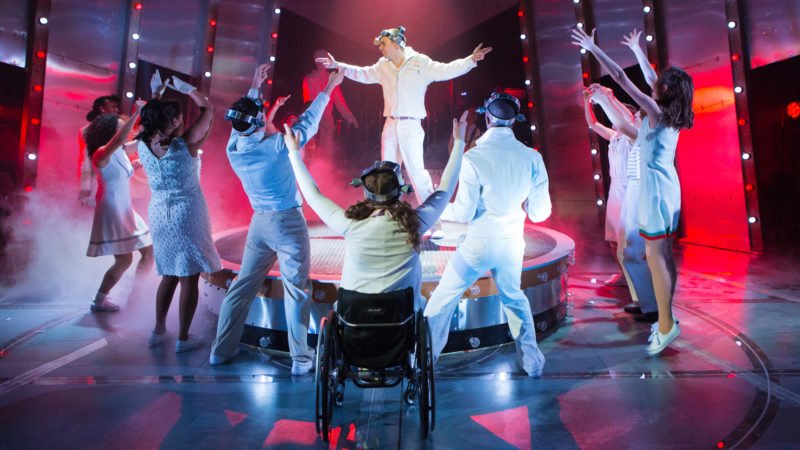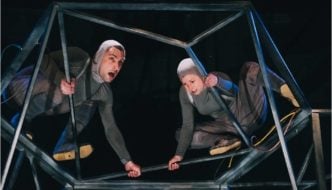 Diverse, lively and shocking, this latest rebirth of The Who’s Tommy by Ramps on the Moon is a spectacle full of surprises.
Diverse, lively and shocking, this latest rebirth of The Who’s Tommy by Ramps on the Moon is a spectacle full of surprises.
Beginning life as a concept album in 1969, before taking to the stage and screen in the 1970s, Tommy tells the troubled story of “that deaf, dumb and blind kid [who] sure plays a mean pinball.” Trauma and medical testing pervade the first act, while fame, fun and a sense of humour fill the second. This story of anguish and redemption births some angsty rock music and some stadium-filling classics, to the audience’s delight.
A stark metallic set frames the band at upstage centre and acts as a canvas for flashing lights and colourful projections. With such a stream of short scenes, the large moving wings of the set felt a little cumbersome, arbitrarily marking locations that could just have easily been separated by lighting or merely stepping aside. But the design comes into its own when subsumed by projections of smashing mirrors and the sensory overload of a pinball machine.
It may seem unusual to mention lighting alone, but the visuals are certainly spectacular. Bright LEDs bring the stage to life and even incorporate The Who’s famous roundel design. In stark contrast, a completely dark stage ominously lights only a pair of hands, at once signing the song lyrics in BSL and shockingly illustrating the abhorrent (yet somehow darkly comedic) song Fiddle About. But the real goose-bump moments are when spotlights rise from the back, marking the two biggest notes on the guitar and exciting any The Who fans in the house.
The band, which play non-stop throughout this rock opera, are phenomenal. Having seen The Who headline Glastonbury, I feared a sub-par tribute act, but the thumping vigour of the band is a delight. At times, some of the singing is a little too ‘musical theatre’ to do the classic songs justice, but Max Runham, as Captain Walker, sings his reprises beautifully. Peter Straker, who returns from the original production of Tommy in the role of the Acid Queen gives a real stand-out performance, even giving the belting, soulful voices of Shekinah McFarlane and Natasha Lewis a run for their money.
But beyond just championing the music that makes this show so famous, this production focuses on championing disabled, or rather differently-abled, performers. The sheer diversity of the cast at first comes as something of a surprise, but impressive collaboration and teamwork draws the company together. Bringing quite a visceral level of realism to Tommy’s character, William Grint gives an emotional performance. Also, the use of voice-doubles for deaf performers adds symbolic weight to the story’s focus on mirrors. Unfortunately though, said voice-doubles, along with an abundance of sign-language interpreters and subtitles, busy the stage and sometimes distracts from the lead action.
But a busy stage is not necessarily negative, as the biggest musical numbers are enacted with full chorus lines, energetic dancing and create an undeniably impressive spectacle. If at times the dancing feels a little gratuitous and detached from the plot itself, that doesn’t diminish the visual awe or detract from the impeccable skill of the ensemble.
Seamlessly bringing together a sizeable, diverse cast, with an onstage band and musicians embedded in the ensemble, Kerry Michael’s production is an innovative ode to The Who and a wonderful evening of theatre. But, for me, the music itself is the undeniable highlight amidst a host of theatrical techniques. Simplifying a few of the bright colours and musical theatre tropes might have done more justice to the operatic genre.
Catch Tommy at West Yorkshire Playhouse until 13th May.
Filed under: Theatre & Dance
Tagged with: Ramps on the Moon, The Who, theatre, Tommy, West Yorkshire Playhouse, yorkshire



Comments